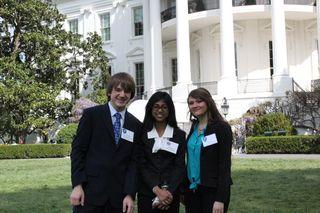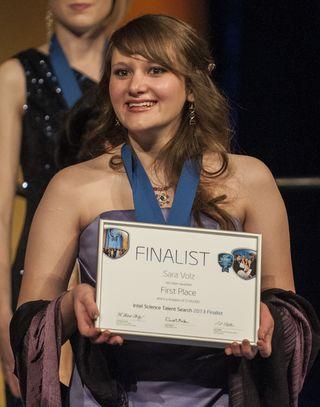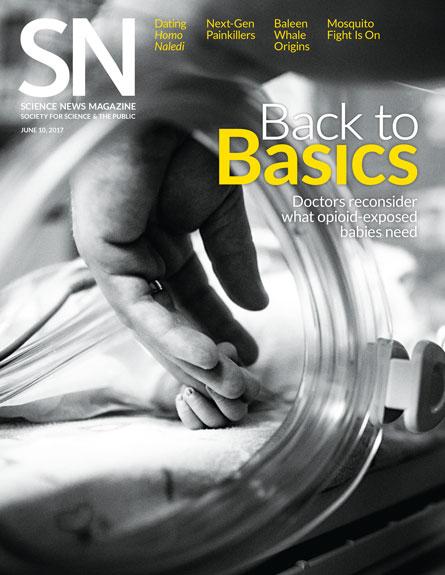Sara Volz Wins Intel STS 2013; Mentioned by President Obama at White House Science Fair
Sara Volz of Colorado Springs, Colorado won first place in the Intel Science Talent Search 2013 and is an alumna of multiple Society for Science & the Public programs, such as the Discovery Channel Young Scientist Challenge, SSP Middle School Program, and Intel International Science and Engineering Fair.

On attending the White House Science Fair in April 2013:
Being part of the White House Science Fair was amazing.
First, we had to get through security. I had to explain that the flask of green stuff I was carrying was algae, as part of my project display. After the guards were satisfied that my green goo and my companions’ various items were not, in fact, a threat to national security, we were taken through the White House to where we could set up our posters.
A little later, we went out onto the White House lawn. Bill Nye and Levar Burton interviewed me—and I was able to join them in the inaugural White House Vine to introduce the science fair! Unfortunately, I am now forever immortalized as saying “—ience rules!” – due apparently to a poor microphone.
After a lunch I barely ate—we were rushed inside pretty quickly—it was time for the presentations. I talked about my work with the new Secretary of the Interior, Sally Jewel, and the Director of the Office of Science and Technology Policy, John Holdren, which was very cool. I was able to explain my algae ideas to a lot of important people and was interviewed by several reporters, including one from the Washington Post.
The President recognized me during his address: he had me stand while he said some very nice things. In reference to my bedroom algae lab, he joked, “You have very supportive parents!” My mother and father aren’t letting me forget that one!
The whole experience reinforces that it really is important for kids to try to do such research. Like so many others I’ve met that also do their own research projects, I do my work because it is what has interested and challenged me. But this attention from adults in significant positions is a clear message that this sort of work is valued—it’s a clear expression that my passion is something that other people value, too!

About winning the Intel Science Talent Search:
My entire experience at the Intel Science Talent Search was unreal. I’ve hoped for years that I could be a part of Intel STS. I was so happy in January to receive the phone call telling me I was a finalist! Everything about the whole week was wonderful. The best part is the other students — everyone is amazing! We all immediately clicked — we all love science and wanted to hear about each other’s work. We shared science jokes and liked the same games. It is so very nice to find such camaraderie.
About her project:
I’ve been interested in biofuels since seventh grade, when I heard about neighbors making biodiesel in their garage. After researching the issue on my own, in ninth grade, I realized how algae can be used as a source of oil for biodiesel—a much better option than soy or corn because it is a more efficient oil producer and can be grown on non-arable land. I’ve been working with algae ever since: it’s a perfect fusion of my passions for alternative energy and biochemistry.
The goal of my work was to make algae biofuels a more feasible option by increasing algae oil yields, and thus fuel production. After a few years of simpler experiments, I had the idea to use artificial selection—guided evolution—to isolate populations of algae with high oil production.
I treated cultures with an herbicide that kills algae with low oil production by blocking a very important enzyme in oil synthesis. Instead of trying to use difficult, complex genetic approaches or environmental techniques with undesirable side effects, this strategy selects for cells with high oil production, by making such overproduction necessary for cells to survive the effects of the herbicide.

On how doing original research and participating in events like the Intel STS has affected her:
From my first science fair in sixth grade through the work I am still doing, I have discovered I love the process of asking a testable question, working through the difficulties of reaching some sort of answer, and inevitably discovering more questions—it sends a quiver of joy down my spine to know that I am stepping, even a little ways, into the unknown.
My experience has definitely taught me to be persistent even in the face of seeming failure—I’ve learned to press on through a wide variety of challenges and disappointments, and now truly believe that what may seem like near disaster should be assessed for what I can learn, flaws I can correct, and facets I can polish.
Science fair events have definitely played a huge role in my participation in research. By now I can say that I would do my work even if there weren’t any fairs or competitions. However, for a student just trying out research for the first time, as I did in sixth grade, doing a project without a fair is like going to soccer practice but never any games.
Since my research is for no class assignment or other commitment, it has been science competitions that have given me deadlines and the chance to present and discuss my work with like-minded peers and adults from around the globe. Such competitions are incredibly inspiring experiences—interacting with so many others who share my level of scientific interest, seeing their amazing accomplishments, and seeing what heights scientific inquiry can reach has motivated me to work even harder. I’ve made lifelong friends through science fairs.
My work has shaped me; it has shown me what I want to do with my life. It is motivating and encouraging, and it is fun. It gives me hope that I can use my knowledge and talents to make a difference.
Advice for other young students interested in science:
If you have questions or wonder about our world, then you have already taken the first step. Science isn’t boring or the tedious memorizing of facts, it’s the process of trying to figure out the world around us, asking a testable question and finding more questions.
I would encourage any young person remotely interested in inquiry and discovery to just start exploring a question you wonder about. Ask your parents and your teachers to help you if you need resources. Search for background information on the internet. Do everything you possibly can yourself – try to answer your questions in ways that don’t require a fancy lab or specialized processes or equipment. When you get to the point that you really know something you want to investigate but do need more specialized help, then don’t be afraid to ask researchers for help. Be considerate—prepare well first, but then politely email the appropriate people to see if someone might be able to help you. Don’t waste researchers’ time, but don’t be afraid to ask for reasonable help after you have studied the topic and understand what you need.
Above all, I would encourage anyone, no matter age, gender, race, available support, or economic position, to explore what you wonder about. It takes curiosity, tenacity and perseverance but you can do it. There has never been a year of doing my own research when I didn’t feel that everything I attempted was failing — that I would not have a project by the time science fair came around. Sometimes, things would finally come together in some unexpected way at the last minute; other times, it never really came together for a clear answer. But that, I learned, is the way science works – we have to rule things out and come up with smaller answers as we slowly but surely parse insight into the world around us.


